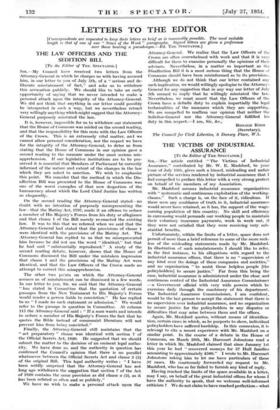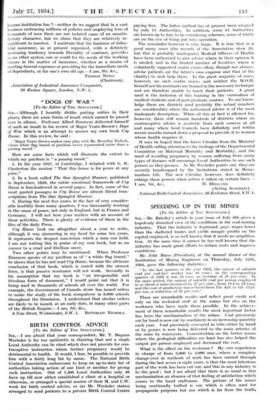THE VICTIMS OF INDUSTRIAL ASSURANCE To the Editor of THE
SPECTATOR.] SIR,—The article entitled "The Victims of Industrial Assurance," contributed by Mr. W. E. Mashford, to your issue of July 13th, gives such a biased, misleading and unfair picture of the services rendered by industrial assurance that I feel compelled to preface this letter with a very strong protest
on behalf of the members_ of my Association. .
Mr. Mashford accuses industrial assurance organizations with " systematic and continuous exploitation of the working- classes." Such a charge is, on the face of it, ridiculous. If there were any semblance of: truth, in it, industrial assurance would never have retained, as it has, the support of the wage- earning population of this country. No skill and efficiency in canvassing would persuade our working people to maintain their voluntary insurance payments, week in .week out, if they were not satisfied that they were receiving very sub-
stantial benefits. • Unfortunately, within the limits of a letter, space does not permit of more than a brief reference to some of the more reek- less of the misleading statements made by Mr. Mashford. In illustration of such misstatements I should like to refer, in the first instance, to his allegations with , regard to the industrial assurance offices, that there is no " supervision of any kind over the doings of these companies and societies," and no organization " to assist those helpless people [the policyholders] to secure justice." Far from this being the case, industrial assurance is administered under the close and continuous control of the Industrial Assurance Commissioner —a Government official with very wide powers which he exercises daily through the machinery of his department. The Industrial Assurance Commissioner, I am confident, would be the last person to accept the statement that there is no supervision over industrial assurance, and no organization to secure justice for the policyholders in any disputes or difficulties that may arise between them and the offices.
Again, Mr. Mashford quotes, without means of identifica- tion, certain cases in which, as he purports to show, individual policyholders have suffered hardship. In this connexion, it is relevant to cite a recent experience with Mr. Mashford on. a similar point. In the course of a debate in the House of Commons, on March 29th, Mr. Harcourt Johnstone read a letter in which Mr. Mashford claimed that since January 1st this year he had " recovered moneys for 57 Hull families amounting to approximately t560." I wrote to Mr. Harcourt Johnstone asking him to let me have particulars of these 57 cases. He courteously forwarded my request to Mr. Mashford, who has so far failed to furnish any kind of reply.
Having reached the limits of the space available in a letter, may I say, on behalf of the great industrial offices for whom I have the authority to speak, that we welcome well-informed criticism ? We do not claim to have reached perfection—what
human institution has ?—neither do we suggest that in a vast business embracing millions of policies and employing teas of thousands of men there are not isolated cases of an unsatis- factory character, but we claim that they are relatively in- significant in number. I maintain that the business of indus- trial assurance, as at present organized, with a definitely increasing tendency towards liberality of contract, provides as no other system can or could for the needs of the working classes in the matter of insurance, whether as a means of meeting funeral expenses or providing for the immediate needs of dependants, or for one's own old age.—I am, Sir, &c., THOMAS NEILL (Chairman). Association of Industrial Assurance Companies, 29 Euston Square, London, N.W. 1.



































 Previous page
Previous page